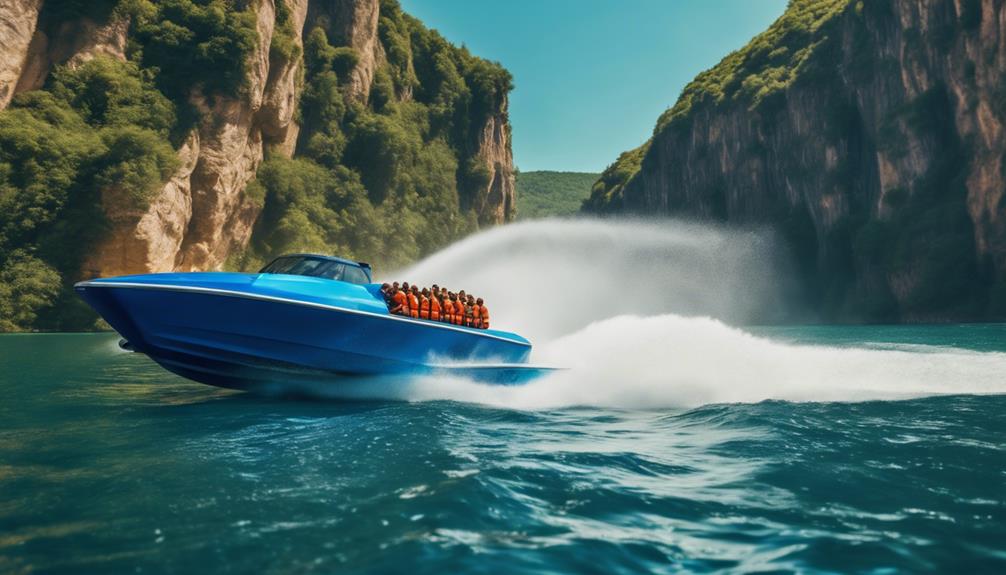Jet boats usually last between 1,500 and 2,500 hours, but this can vary based on the engine type and maintenance routine. If you have a 2-stroke engine, expect a lifespan of about 700 to 900 hours, while 4-stroke engines can stretch to around 2,000 to 3,000 hours with decent upkeep. Regular maintenance, like oil changes and inspections, is vital for maximizing your boat's lifespan. Environment also plays a role—freshwater use often prolongs engine life compared to saltwater. Want to guarantee yours lasts longer? There's more to take into account when it comes to maintenance and usage patterns.
Key Takeaways
- Jet boat engines typically last between 1,500 to 2,500 hours, depending on the engine type and maintenance practices.
- 2-stroke engines generally have a lifespan of 700 to 900 hours, while 4-stroke engines can reach 2,000 to 3,000 hours.
- Regular maintenance, including oil changes and inspections, is crucial for maximizing engine lifespan and performance.
- Operating conditions significantly affect engine life; freshwater environments promote longer lifespans compared to harsher saltwater conditions.

Yamaha Yamalube Watercraft II Oil Change Kit, #LUB-WTRCG-KT-10
Sold Each
As an affiliate, we earn on qualifying purchases.
As an affiliate, we earn on qualifying purchases.
Understanding Jet Boat Lifespan
Understanding the lifespan of your jet boat is vital for maximizing its performance and guaranteeing enjoyable outings on the water. Jet boats generally have a lifespan ranging from 1,500 to 2,500 hours, but this can vary based on the engine type and how well you maintain it.
If you own a 2-stroke jet boat, it's important to know that its engine life expectancy typically falls between 700 and 900 hours, with a replacement recommended after reaching 900 hours.
In contrast, well-maintained 4-stroke jet boat engines can last considerably longer, potentially reaching 2,000 to 3,000 hours before requiring major overhauls. Regular maintenance can't be overstated—routine oil changes and inspections are essential for extending your engine's lifespan. Neglecting these tasks can lead to premature failures that'll cut your time on the water short.
Additionally, consider the type of water your jet boat operates in. Freshwater environments usually promote longer engine life compared to saltwater, which can accelerate wear and tear.

Mercury Engine Repair and Maintenance Manual, All 2 Stroke Engines, 2001 to 2009
Manuals are based on actual teardowns done by Seloc authors
As an affiliate, we earn on qualifying purchases.
As an affiliate, we earn on qualifying purchases.
Average Engine Hours for Jet Boats
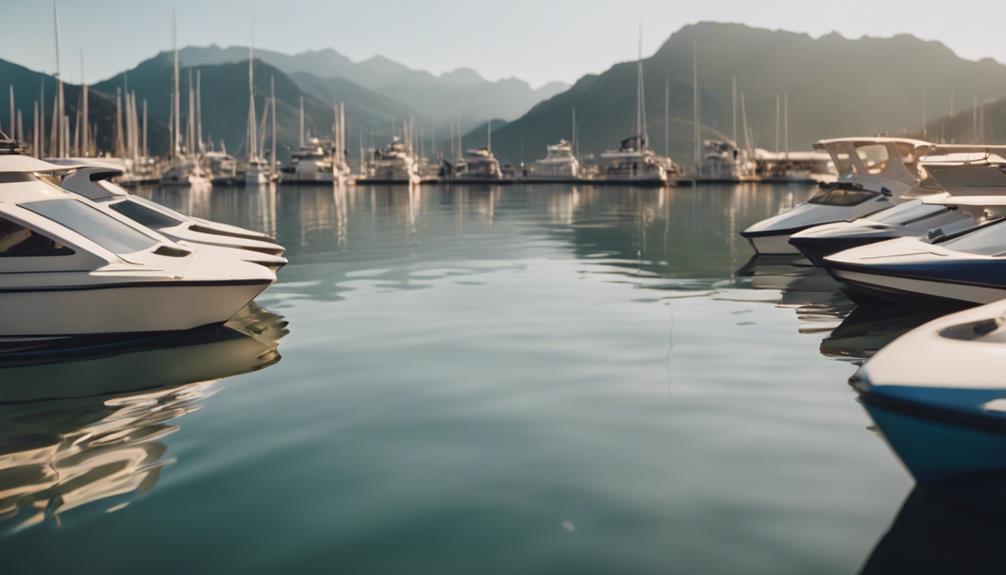
When it comes to jet boat engines, understanding their average lifespan is essential for any owner.
Typically, you can expect around 700 to 900 hours before significant repairs are needed, but your usage and maintenance habits play a big role in longevity.
Typical Engine Lifespan
The typical lifespan of a jet boat engine ranges from 1,500 to 2,000 hours, largely depending on how well you maintain it and the conditions in which you use it.
Regular maintenance is essential for maximizing your engine's life expectancy. If you're diligent about oil changes, inspections, and other routine upkeep, you can greatly extend the engine's lifespan beyond the average range.
Operating conditions also play an important role. Engines used in calmer waters tend to last longer than those subjected to rough conditions or frequent high-speed maneuvers. Additionally, the type of fuel you use can affect engine performance and longevity.
Interestingly, many jet boat owners often sell their boats before reaching the upper limits of this lifespan. It's not uncommon for engines to be replaced or upgraded before they hit the 1,500-hour mark.
Usage Impact on Longevity
Usage patterns considerably affect your jet boat's engine longevity, with recreational users typically averaging between 50 to 100 hours of operation each year. This moderate usage tends to promote a healthier engine lifespan, allowing it to last between 1,500 to 2,000 hours.
However, if you push your boat beyond 200 hours in a year, you might notice accelerated wear and tear, which can greatly reduce its overall lifespan.
Consider these factors regarding usage impact on longevity:
- Recreational Use: 50 to 100 hours per year is ideal.
- High Usage: Exceeding 200 hours can lead to quicker degradation.
- Environmental Conditions: Saltwater use can be harsher on engines than freshwater.
- Type of Activities: Racing or heavy towing can increase engine strain.
Maintenance Importance for Durability
Regular maintenance is essential for ensuring your jet boat engine reaches its best lifespan of 1,500 to 2,000 hours. The maintenance importance can't be overstated; it directly impacts the longevity and performance of your engine. By keeping up with regular oil changes and inspections, you can greatly extend your engine's lifespan beyond the average. Neglecting these essential tasks may lead to premature engine failure, reducing the hours your jet boat can operate effectively.
Factors like the type of water you use, whether it's freshwater or saltwater, and the engine load can also influence lifespan. This highlights the need for tailored maintenance practices. For example, if you have a well-maintained diesel engine, you'll likely see better performance and durability compared to one that's been neglected.
Professional servicing at recommended intervals—typically every 50 to 100 hours—ensures your engine remains reliable and performs at its best. This proactive approach not only enhances your boating experience but also maximizes the total hours logged on your jet boat.
In short, prioritize maintenance to keep your engine running strong and enjoy many hours on the water.

labwork Manhole Cover Clean Out Pump Repair Kit Replacement for Yamaha Jet Boat 2000-2016 F0R-67609-09-00
Manhole cover repair kit replacement for Yamaha jet boat 2000-2016
As an affiliate, we earn on qualifying purchases.
As an affiliate, we earn on qualifying purchases.
Factors Affecting Longevity
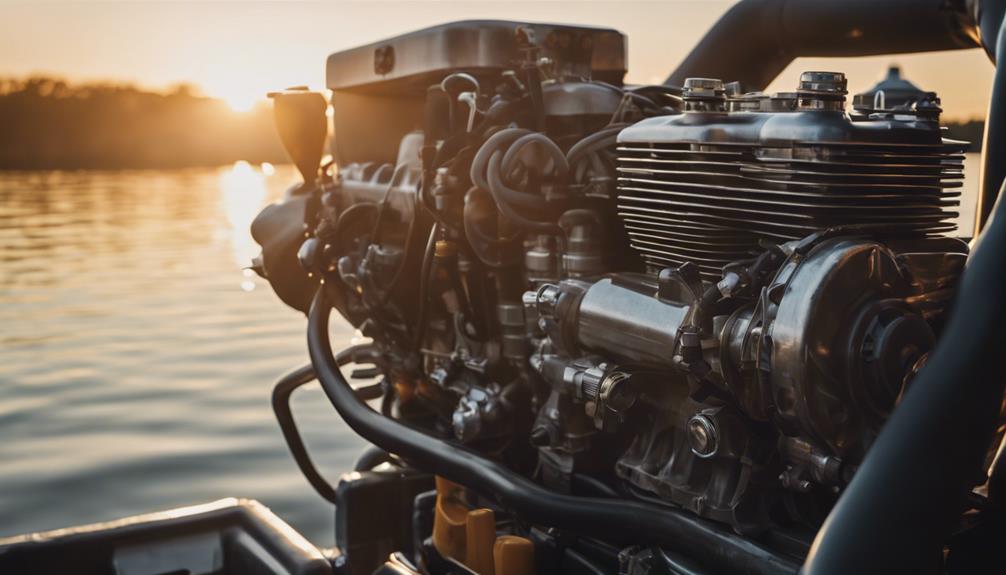
When it comes to your jet boat's longevity, several key factors come into play.
Your engine maintenance practices, the operating conditions you encounter, and your usage habits all greatly impact how long your boat will last.
Engine Maintenance Practices
Effective engine maintenance practices, like timely oil changes and thorough inspections, play an essential role in maximizing the lifespan of your jet boat's engine.
By addressing wear and tear proactively, you can prevent costly repairs and extend your engine's operational life considerably.
Here are some key practices to keep in mind:
- Regular oil changes: Fresh oil lubricates and protects engine components.
- Filter replacements: Replace fuel and oil filters to guarantee peak performance.
- Routine inspections: Check for corrosion, leaks, and overheating signs.
- Cooling system maintenance: Confirm your cooling system is functioning properly to avoid overheating.
Operating Conditions Impact
Operating in harsh conditions can greatly reduce your jet boat's lifespan. Factors like saltwater exposure and heavy engine loads lead to increased wear and tear. If you frequently navigate in saltwater, you're exposing your boat to corrosive elements that can substantially deteriorate its components. The engine also suffers under heavy loads, which can cause overheating and additional stress on the system.
Inconsistent use, such as long idle periods followed by short runs, can negatively impact your engine's health. This can lead to carbon buildup and other issues that compromise performance. Proper ventilation and efficient cooling systems are vital; without them, your engine might overheat, further shortening its lifespan.
To combat these challenges, regular boat maintenance is necessary. Routine inspections can help identify potential problems before they escalate. Avoiding overloading your boat during excursions also contributes to better longevity.
Usage Patterns and Habits
Usage patterns and habits play an essential role in determining how long your jet boat will last, impacting everything from engine wear to maintenance needs. The way you use your boat can either extend its lifespan or lead to premature failure.
Frequent outings increase engine wear. Operating at full throttle adds stress to components. Saltwater environments cause more corrosion than freshwater. Regular maintenance is vital for longevity. Seasonal usage can affect wear rates.
If you're out on the water often, especially in harsh conditions, your engine's wear will accelerate. Consistently running at full throttle may seem thrilling, but it puts extra strain on your engine, reducing its lifespan. It's also important to take into account your environment; saltwater can wreak havoc on your boat, increasing maintenance needs.
To keep your jet boat in excellent condition, prioritize regular maintenance practices like oil changes and cooling system checks. The more you understand how your usage patterns affect engine wear, the better equipped you'll be to enjoy many hours of boating without worrying about premature wear and tear.

ANCEL MR500 Marine Diagnostic Tool for Yamaha (2003–2024) – Jet Ski & Outboard Engine Scanner, 15+ Service Functions, Read/Clear Codes, Live Data, Active Tests
【Comprehensive Yamaha Marine Diagnostics】One Tool, All Models—Dealer-Level Power at Your Fingertips. The ANCEL MR500 supports for Yamaha WaveRunner…
As an affiliate, we earn on qualifying purchases.
As an affiliate, we earn on qualifying purchases.
Importance of Regular Maintenance
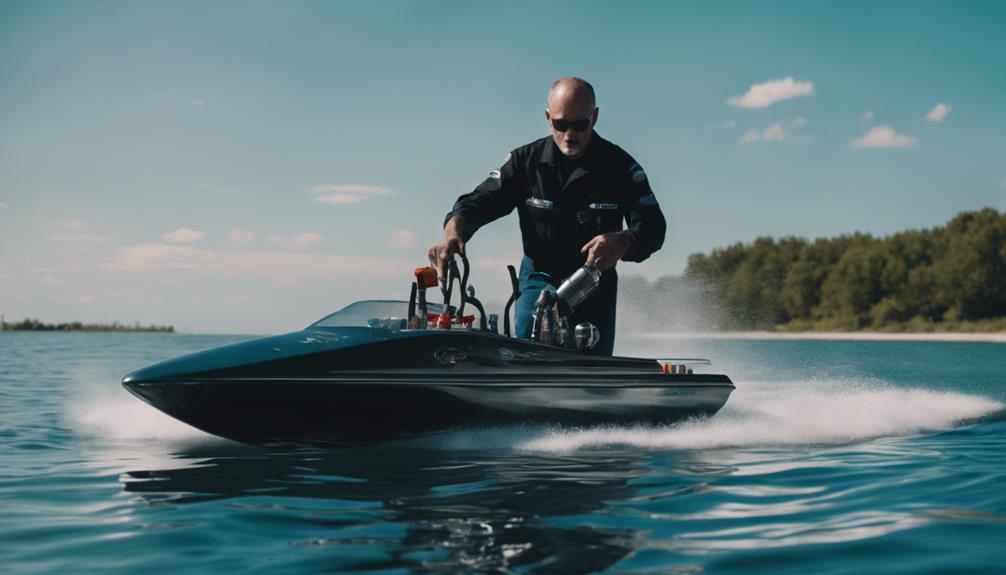
Regular maintenance is essential for maximizing your jet boat's lifespan and ensuring reliable performance throughout its life. When you invest in routine maintenance, you can greatly enhance the life expectancy of your engine, with properly maintained units lasting anywhere from 1,500 to 8,000 hours. Key practices include regular oil changes, filter replacements, and thorough inspections of the cooling system to prevent overheating.
Neglecting these maintenance tasks can lead to rapid engine failure, especially after the first 1,000 hours for gasoline engines, so consistent care is critical. Seasonal maintenance, like winterization and corrosion checks, is important, particularly if you operate in saltwater environments where corrosion can wreak havoc on your engine.
Moreover, keeping a detailed record of your maintenance history not only boosts engine reliability but also enhances your jet boat's resale value. Potential buyers appreciate knowing that the vessel has been well cared for.
Typical Usage Patterns
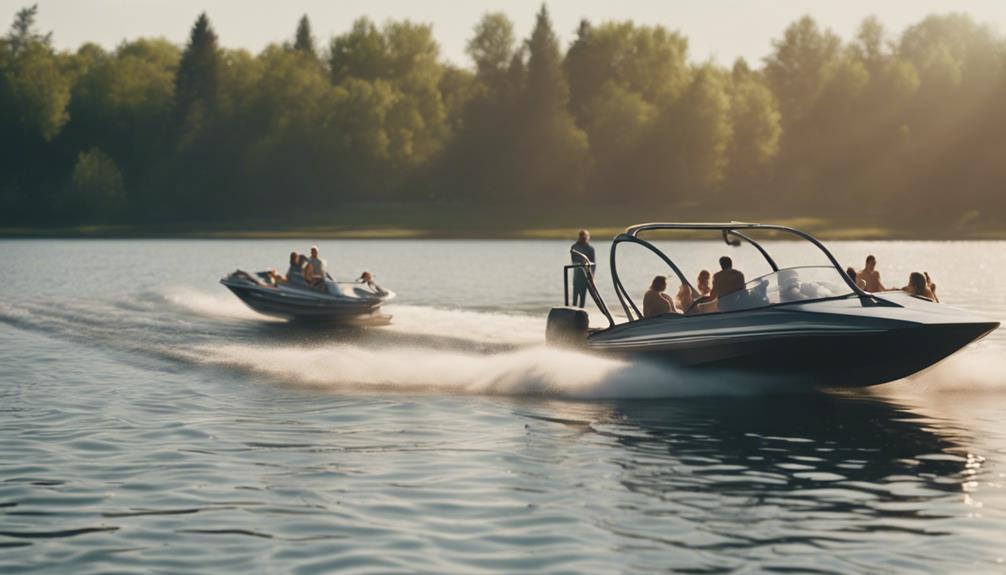
When you think about how you use your jet boat, it's clear that common activities and seasonal trends play a big role in its lifespan.
Most owners rack up less than 100 hours a year, but those summer months can really add up.
Understanding these usage patterns helps you manage your boat's engine hours effectively.
Common Jet Boat Uses
Many jet boat owners enjoy a variety of recreational activities, like water skiing and wakeboarding, often logging between 50 to 100 hours on the water each year. These vessels are incredibly versatile and can cater to multiple uses, making them popular among boating enthusiasts.
Here are some common jet boat uses you might consider:
- Water Skiing: Perfect for cutting through waves while you glide on the water.
- Wakeboarding: Experience thrilling rides as you catch air off the wake.
- Tubing: Fun for all ages, tubing provides excitement for family and friends.
- Cruising: Enjoy leisurely outings on lakes or rivers, soaking in the scenery.
Your hours a year spent on these activities can vary based on personal habits. Some owners prefer weekend trips, while others may use their boats daily during the season.
Regardless of how you choose to enjoy your jet boat, knowing these common uses can help you maximize your time on the water.
Seasonal Usage Trends
Understanding how seasonal usage trends affect your jet boat's performance can help you plan your outings more effectively.
During the summer months, you'll likely find yourself using your jet boat more frequently, especially if you enjoy activities like water sports or cruising. This peak season can lead to a significant increase in the number of hours logged on your hour meter, with average annual usage typically falling between 50-100 hours.
However, your actual usage may vary greatly depending on factors like your location and access to water. If you live near popular lakes or rivers, you might engage in more outings, adding to the total hours on your hour meter. Conversely, during the winter months, when your boat may be stored away, the number of hours will drop considerably, impacting its overall performance and maintenance needs.
If you're into high-intensity activities like wakeboarding, expect your jet boat to log more hours compared to casual cruisers.
Engine Hours Analysis
Analyzing engine hours reveals that most recreational jet boat owners log around 100 hours annually, but this can vary widely based on usage patterns and water conditions. Your jet boat's life expectancy is heavily influenced by how often and where you use it.
Consider these factors that impact your engine hours:
- Type of water: Saltwater can be more corrosive than freshwater.
- Owner habits: Frequent use leads to increased wear and tear.
- Seasonal trends: Some owners only use their boats during peak seasons.
- Maintenance routine: Regular oil changes can extend engine life.
Each of these factors plays a significant role in determining how long your jet boat will last. If you're logging high engine hours, it's essential to maintain your boat properly.
Regular maintenance can help you push past that average lifespan of 700 to 900 hours. By understanding your usage patterns, you can make informed decisions that contribute to extending your jet boat's life expectancy.
Signs of Engine Wear
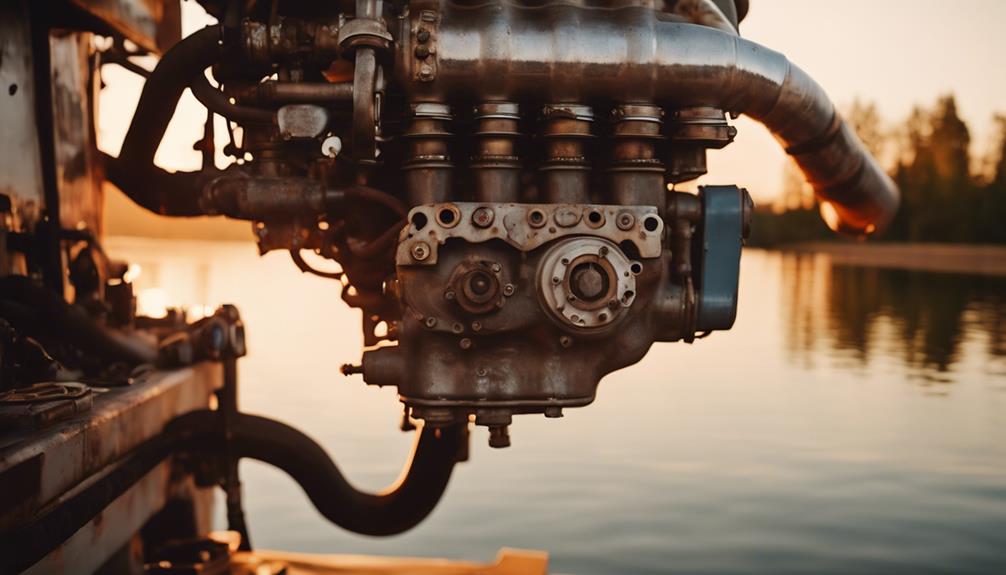
As your jet boat approaches 700 hours of engine use, keep an eye out for signs of wear, like reduced power or unusual noises. These symptoms often indicate that your engine is experiencing wear, which can greatly impact its overall engine life. If you notice a decline in performance, it's vital to investigate further.
Unusual noises, such as knocking or grinding, can signal potential internal damage. Increased oil consumption is another red flag; it may suggest that components are wearing down and causing oil to leak or burn. Additionally, colored smoke during operation can reveal underlying issues. Black smoke typically indicates an overload, while blue smoke suggests oil burning due to worn parts.
Monitoring your engine hours and performing routine inspections help catch these signs early. Regular maintenance, like decarbonizing and using quality fuel, plays a key role in extending your engine life and minimizing wear.
Assessing Used Jet Boats

When you're looking to buy a used jet boat, evaluating its overall condition and maintenance history is key to guaranteeing you make a sound investment. Pay attention to the following aspects:
- Engine Hours: Check the total hours on the engine, as boats with over 1,500 hours may need a major overhaul.
- Maintenance Records: Look for thorough records that indicate regular servicing and adherence to maintenance schedules.
- Hull Condition: Inspect the hull for any signs of damage or wear, as this can affect performance and safety.
- Jet Drive System: Evaluate the jet drive system to confirm it's functioning properly, as issues here can be costly.
Engine Types and Their Durability
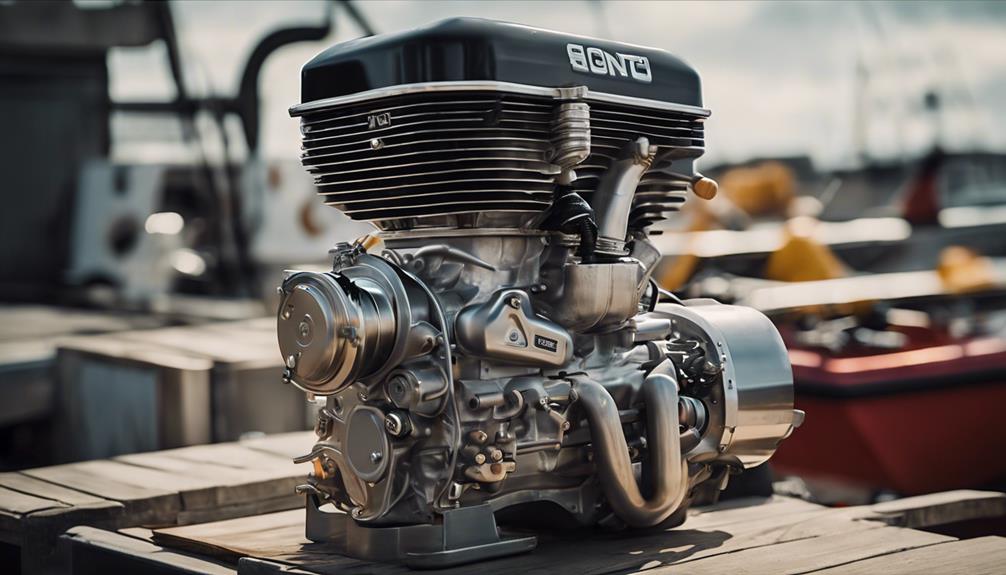
What engine type you choose for your jet boat can greatly influence its durability and overall lifespan. Jet boats typically come equipped with either 2-stroke or 4-stroke engines.
If you're aiming for longevity, a 4-stroke engine is your best bet, boasting an average lifespan of 1,500 to 2,000 hours when well-maintained. In contrast, 2-stroke engines usually last around 700-900 hours before they need replacement.
If you lean towards performance, you might consider a marine diesel engine, known for its durability and efficiency. Diesel engines often outlast their gasoline counterparts and can provide a longer operational life, especially under demanding conditions.
However, keep in mind that regardless of the engine type, proper maintenance is essential. Regular servicing and adherence to break-in procedures can greatly extend your engine's life.
Operating conditions also play an important role; high-performance use can exacerbate wear and tear. As a result, always make sure you're using quality fuel and addressing maintenance needs promptly.
Maintenance Practices for Longevity
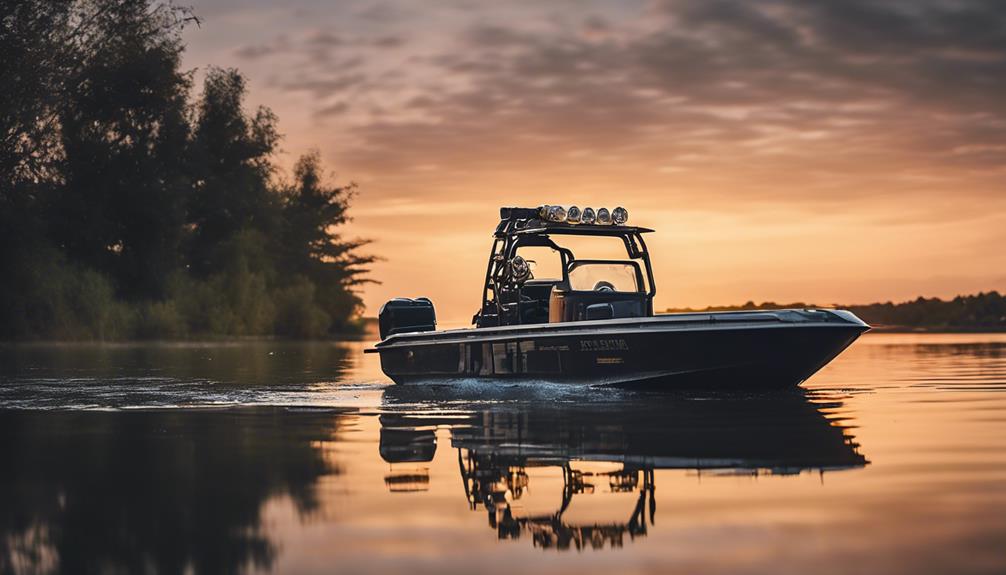
Regular maintenance is key to guaranteeing your jet boat engine lasts as long as possible. By following a consistent maintenance routine, you can greatly extend your engine life and enjoy your time on the water without worry.
Here are some essential practices to keep in mind:
- Change the oil and replace filters regularly.
- Decarbonize the engine to prevent buildup.
- Use high-quality fuel to maintain performance.
- Upgrade components like reed valves for improved longevity.
Neglecting these maintenance practices can lead to serious issues like overheating, which can dramatically shorten your engine life.
Be sure to follow proper break-in procedures initially to set a strong foundation for your engine's longevity.
Remember, addressing minor issues promptly can save you from costly repairs down the line.
By adopting these maintenance habits, you'll not only enhance your jet boat's performance but also guarantee that your engine runs smoothly for years to come.
Prioritize these practices, and you'll enjoy a reliable boating experience!
Resale Value Considerations

Understanding the factors that influence resale value can help you make informed decisions about your jet boat investment. One of the most notable considerations is the number of engine hours on your boat. Generally, jet boats with fewer than 300 engine hours maintain a better resale value than those with higher hour counts. If your boat has over 1,500 engine hours, you might see a considerable drop in its resale value due to concerns about wear and tear.
However, don't fret if your jet boat has higher hours; the condition and maintenance history can offset this issue. If you've diligently documented regular maintenance and care, it enhances your boat's credibility and can boost its resale value, even if the engine hours are elevated.
Typically, an average annual usage of 50-100 hours is ideal for maintaining a strong resale market position. By being mindful of your boat's engine hours and keeping up with maintenance, you can greatly impact its resale potential in the long run. Prioritize care and documentation to guarantee that you maximize the value when it's time to sell.
Frequently Asked Questions
How Many Hours Do Jet Boats Last?
Jet boats usually last between 1,500 and 3,000 hours, depending on maintenance and conditions. You can extend their lifespan by regularly servicing them and choosing the right operating environment, like freshwater over saltwater.
How Long Do 4 Stroke Jet Boat Engines Last?
Your 4-stroke jet boat engine's like a well-tuned symphony, capable of lasting 1,500 to 2,000 hours with care. Regular maintenance guarantees it plays beautifully, maximizing performance and keeping your adventures afloat longer.
How Many Hours Does a Jet Engine Last?
A jet engine typically lasts around 1,500 to 2,000 hours if you maintain it properly. Pay attention to operating conditions and routine maintenance to maximize its lifespan and prevent unnecessary wear and corrosion.
How Many Hours Is a Yamaha Jet Boat Good For?
A Yamaha jet boat's lifespan typically ranges from 1,500 to 2,000 hours with proper care. If you maintain it well, you might even enjoy over 2,000 hours of thrilling water adventures before major repairs are needed.
What is the Lifespan of a Jet Boat and How Does Running it Without Water Affect its Lifespan?
The lifespan of a jet boat is highly dependent on various factors, including maintenance, usage, and proper care. Running a jet boat dry without water can significantly impact its lifespan, causing damage to the engine and other components. It is important to always ensure that a jet boat is properly lubricated with water to avoid costly repairs.
Conclusion
To summarize, understanding a jet boat's lifespan means knowing its engine hours, embracing regular maintenance, and recognizing how usage affects durability.
By evaluating used models wisely, you can gauge their longevity and resale value.
With proper care, you can enjoy thrilling adventures on the water for years to come, ensuring your investment pays off.
So, prioritize maintenance, choose wisely, and ride confidently, knowing you've set the stage for countless unforgettable moments on your jet boat!






